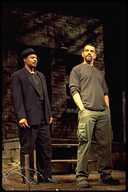SITE GUIDE
SEARCH
REVIEWS
FEATURES
NEWS
Etcetera and
Short Term Listings
LISTINGS
Broadway
Off-Broadway
NYC Restaurants
BOOKS and CDs
OTHER PLACES
Berkshires
London
California
DC
Philadelphia
Elsewhere
QUOTES
On TKTS
PLAYWRIGHTS' ALBUMS
LETTERS TO EDITOR
FILM
LINKS
MISCELLANEOUS
Free Updates
Masthead
Writing for Us
A CurtainUp Review
King Hedley II
.
by Les Gutman
|
If you want to beat the system, you got to make your own rules. ---August Wilson |

M. Russell & B. Mitchell
(Photo: Joan Marcus) |
It's toward the end of the first act that one recognizes that in Hedley we have a latter-day Hamlet. It's an awareness brought on not so much from Brian Stokes Mitchell's King Hedley, but by his wife, Tonya (Viola Davis), whose entreaty to her husband (I'll call it her "Be a Man" speech) eloquently embodies the seemingly inextricable, almost genetic core of crime, violence and failure that defines the fate of black men in inner city America, and the concomitant reaction of its women. With Davis's blistering potency, memorable in every respect, it recalls Polonius's "Neither a borrower nor a lender be", and may well be the most powerful female monologue in contemporary dramatic literature; its performance surely becomes the standard against which the rest of this production must be judged.

Brian Stokes Mitchell
|
Hedley brings forward the story Wilson began telling in his play focusing on the late 40's, Seven Guitars. The central female there is now a woman in her sixties, Ruby (Leslie Uggams). Her young son then is now our King Hedley II, already wearing the badge of an ex-con (having served time for murder). With his Horatio, named Mister (very well played by Monté Russell), he is engaged in small-time crime (selling stolen refrigerators for $200 a pop, robbing the neighborhood jeweler), trying to raise enough funds to start a legitimate business. Its a dream vanquished by the realities of supply-side economics that translate into little more than minimum wage jobs and a system that's not about to play by his rules.
The story also brings forward Elmore (Charles Brown), still after Ruby's affections. He's now a voluble con-man impressed with his own elegance, and portrayed with precision and humor. It is Elmore who brings down young Hedley's house of cards, forcing a revelation -- one we know all along -- that his namesake, the man (himself a murderer) who died when the boy was three but who has been his idol, was not in fact his father. It is not this man's ghost nor his crown that haunts Hedley II, but the contents of a not-unrelated dream: "You see a halo around my head?," he keeps asking.
Wilson has fashioned these characters at once ordinary and larger than life. But it is in the character he now calls Stool Pigeon (Stephen McKinley Henderson), the man known as Canewell in Seven Guitars that Wilson invests the play's broadest world view. Functioning as a Greek chorus and the play's moral and cultural concordance, Henderson leaves Wilson's most indelible imprint.

Leslie Uggams
|
The play also boasts a creative team that is well on its way to being viewed as Wilson's principal interpreters, led by Marion McClinton, whose direction is flawlessly at one with Wilson, and whose ability to stage his story adds immeasurably to it. McClinton helmed Wilson's Jitney this past year, and has brought along set designer David Gallo (perfectly recreating the yards and houses of this pock-marked, decayed Hill District neighborhood), lighting designer Donald Holder (stunningly effective as always) and sound designer Rob Milburn (who does a fine job of mixing hopeful soul with the harsh realities conveyed by songs like Ice Cube's "The Wrong Nigger to Fuck With".He also more than does justice to the meows of the alley cats that are denizens of the 'hood.)
Our enthusiasm for the play has to be tempered by the underwriting that seems to hamper King and Ruby, and by what seems like an uneven job of nipping and cutting. (The original stagings of this play in several regional outings ran considerably longer than the current three-hour version.) There's an awful lot about Hedley II we'd like to know but don't discover: flesh on the bones of his relationships with his wife and mother, the effects of his lengthy incarceration, etc. There's also material that is included (seemingly in abbreviated form) that we don't quite understand (such as the story of his former love, whom he now visits regularly at the cemetary, clearly a strain in his relationship with Tonya.) None of these quibbles offset the substantiality of what Wilson has tendered and, after all, no one ever accused Shakespeare's great Dane of being perfect either.
LINKS
L.A. Review of King Hedley II
Review of Jitney
|
KING HEDLEY II
by August Wilson Directed by Marion McClinton Starring Brian Stokes Mitchell with Leslie Uggams, Charles Brown, Viola Davis, Lou Myers and Monté Russell Set Design: David Gallo Costume Design: Toni-Leslie James Lighting Design: Donald Holder Sound Design: Rob Milburn Waltz Choreographer: Dianne McIntyre Fight Director: David S. Leong Running Time: 3 hours including one intermission Virginia Theatre, 245 W. 52nd Street (7th/8th Avs.) Telephone. 239-6200 Opening May 2, 2001 for open run Closing 7/01/01 Tue - Sat @8; Wed & Sat @2; Sun @3; $25 - $70. Les Gutman based on 5/1/01 performance |


